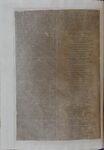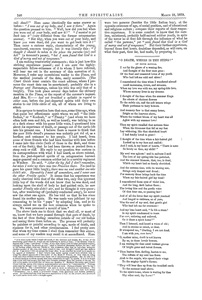 |
vol. title: Vol Four of The Theosophical Society of The Arya Samaj of Arya-wart vol. period: Sept 1878 – Sept 1879 pages in vol.: 350 |
< Two Experiences of the Process of Death (continued from page 8-175) >
call dead?” Here came identically the same answer as before: “I was out of my body, and I san it there.” Again the question pressed on him. “Well, how did you feel when you were out of your body, and saw it?” “I wanted to get back into it” (very different from the former octogenarian answer). “But why, when you were out of your body, and knew you were dead, did you want to get back into it?” Then came a curious reply, characteristic of the young, uncultured, common trooper, but it was literally this: “I thought I should be taken to the place the parsons (sic) call hell” (a moment’s pause), “but I soon found that God is a God of mercy and not of vengeance.”
I am making trustworthy statements; this is just how this striking experience passed; and I am sure the highly- respectable fellow-witnesses of it to whom I have referred, will bear me out in the accuracy of this narration of it. Moreover, I refer any incredulous reader to the Times, and the medical journals of the date, easily accessible. (The Court Guide must contain the exact address, where I presume the exact date can be ascertained; probably also in a Peerage and Baronetage, unless his title was only that of a knight). This took place several days before the obituary mention in the Times, or the report of the coroner’s inquest. And Mrs. H—had not breathed a syllable, in regard to either case, before the just-departed spirits told their own stories to our little circle of six, all of whom are living to attest.
It is apropos to mention here that once, some time ago, when that queer but affectionate spirit whom we call “the little Indian,” or “Keebosh,” or “Franky” (and whom we have often both seen and felt, as well as heard), was talking to us at a dark seance with his queer little voice, I questioned him about his experience of death, or passage out of the earth-life into his present one. I believe there is reason to think that the poor little dwarf’s presence was unfairly got rid of, as a burthen and nuisance to his people. I had heard, from some of those friends who had been familiar with him before I came into this circle (both of those in the flesh, and those out of the flesh), that he had been thrown or pushed from a steep rock or cliff. His reply to my question was curious in its correspondence with what I had heard, as above related, from the just-departed spirits of an octogenarian baronet major-general and a common soldier lad in a cavalry regiment at Windsor. He said, “After the big fall I don’t remember, but when I woke up there was two Frankies there. Fes (and he gave his queer little laugh), there was me and another one who didn’t stir. By-and-by I went off somewhere, and I never saw the other Franky again.” It seems that his experience was really identical with that of the other two, only this ignorant little boy of the woods did not know that he was dead, and looking upon the shell of body he had quitted only, he saw another Franky who didn’t stir, and he thought it very queer; but, after wandering off (probably conducted away), he never saw the other one again. He has told us that he has since found his mother again. He was made very jubilant by my consenting to be his “papa” by adopting him, and so he always called me on the rare occasions when he spoke to us. We were promised a mould of him.*
The above leads me to think that we shall all, or most of us, know that we have passed through that gate of death, by the fact of thus finding ourselves outside of our old bodies and seeing them there before us. The process will probably be painless or painful according to age, mode of death, and ripeness for it, and other circumstances. I feel pretty sure that when my time comes I shall then remember this seance, and some of my readers may recall it at secondhand. Here were two persons (besides the little Indian boy), at the opposite extremes of age, of social position, and of educational and religious culture; compare their reports of their respective experience. It is some comfort to know that the careless, unlettered, probably half-animal soldier youth, in spite of the terror he at first felt through the influence of what he called “the parsons,” yet “soon found, that God is a God of mercy and not of vengeance.” But their further experience, beyond those first hours, doubtless depended, as will ours, on what their past, thus far, had made, by preparing it.
* If it were worth while I could, tell much of his caresses and kisses, &c,, to me; of his blubbering grief when he would see me suffering in mind or body; of his distress when he fancied that I had “got tired” of him; of his once, when I was in some pecuniary anxiety, asking me whether he should go and “steal a, hundred thousand dollars for me;” and of his having added, after my rebuke of this audacious offer, that he had some wampum (Indian money) of his own, and knew where it was, and thought I could get two dollars for it. I am sorry I did not accept the latter offer, to see whether he could have made me an apport of wampum! I don’t believe that better spirits would have allowed him to bring the offered apport out of the vaults of the Bank of France, as they often do bring frosh and dew-covered flowers and fruits out of neighbouring gardens. But he told us of a certain medium to whom money had been sometimes brought by spirits. It is to be hoped that it was only lost money that they thus brought, perhaps from the bottom of the sea. He told us his name, but added that we must not mention it. Madame Blavatsky and Colonel Olcott hold the spirits who come at materialisation seances to be “elementaries.” Perhaps some may be, though I am very sure that all are not such. Perhaps Franky may be, but I do not think so. The “elementaries” are said to have no affection nor conscience. The hundred thousand dollars proposal was not very moral, and therefore docs look rather “elementary,” but I think it proceeded simply from ignorance and Indian predatory ways. He understood my little lecture or explanation to him on. the subject, and promised he would never think such a thought again.
O Death, Where is Thy Sting?
I sat by the gloom of a waning fire, |
Editor's notes
- ↑ O Death, Where is Thy Sting? by Saville, Edith, London Spiritualist, No. 343, March 21, 1879, p. 140
Sources
-
London Spiritualist, No. 343, March 21, 1879, p. 140
